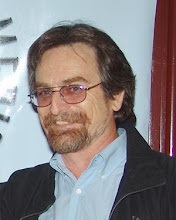A Well-Reasoned Rant: Part One
So it’s still about written versus performance poetry, is it?
I’ve read in various places that “the written word is dead” and that “no
one reads anymore.” One ‘column’ in a
local lit journal by the sois-dissant ‘Psycho Boy’ desperately tried to
make a case for dealing the final blow to ‘written poetry’ on the basis that “no
one wants to read.” But styling oneself ‘Psycho
Boy’ is enough against-the-grain truth in advertising for sensible persons to
take his message with about a pound of salt.
Psycho Boy would do well to look beyond his narrow confines – there are tens
of thousands of people out there who love to read from the page (and a growing
number who now like reading from a tablet – oh, how the Sumerians must have
howled when it looked like there was in the wind a move from cuneiform
impressions in clay tablets to ink-marks on parchment).
Look, we’re all
of us – we poets and performers, we poet/performers – self-combusting elements
trapped in this thing of art and artifice.
No one of us writes or performs because we want to. Those who only want to write are not
poets, those who want to perform are audience members on open-mike
night. It’s clear to me that we – the
poets – stay in the poetry game because we have no other choice.
Ignoring those exhibitionists who just want to make
noise while others must sit watching and listening (please let us dispatch them
quickly, Psycho Boy, here at this point and later, in the galleries and
coffeehouses), we can look at this “artistic division” in the light of a
similar dichotomy of two musical styles.
The analogy will only stretch so far, but let it have its distance to
find its range.
For a trained
opera singer, the “primitive” 3-chord progression of American blues is a low
form of art. Blues is all emotion, all
emotive power, while opera starts in artifice and works its way through
carefully-planned “attacks” (a common term for the actual approach to the
musical exercise, with any instrument – human or mechanical). The music in each of these forms is
conceived, written and performed differently, and the audience seeks different
things. But the heart of the matter, in each case, is that the vocal instrument
will affect the audience and (it is hoped) bring about new insights or rekindle
certain feelings.
So we don’t
expect John Lee Hooker to get up and sing the arias of Nemorino or Calaf,
because the form of his music is fundamentally different. There is a natural separation between these
two forms – a fact for which many of us are grateful. Nor would Pavarotti have belted out Stevie Ray Vaughn
or BB King or Robert Johnson (though a trained opera voice would have a better
chance in an acceptable attempt at crossover than would a blues singer). (In fact, Pavarotti did welcome James Brown to his stage and even sang a song or two with him - but as i pointed out, the analogy would only stretch so far.)
In poetry, as in music, the
person with a stronger foundation from which to build will most likely be
better able to express emotion in words; such a poet will probably be better
prepared to delineate and capture the essence of a scene. Then, carefully overlaying the artifice of
skilled performance, the poet subtly manipulates the audience so that they will feel those
things which he or she initially intended (at the conception of
the piece) for them to feel. There is an aspect of
determinism to this art, as with all forms of art.
I once watched a grown man rub halves of a raw onion
in his eyes while reading a diary entry through a paper tube jammed in his
mouth – it was not poetry, but it certainly was performance. It did awaken certain feelings in the
audience: nervousness, unease, shock,
disgust, pity. Had he written his work
with some craft and wit, had he determined to prepare a specific set of actions
and emotions, then the onion would have added a dimension to something already
existing. As it was, the onion shone
brilliantly – as the sole star of an otherwise execrable act.
This ‘feud’ (if
that word does not dignify the situation too much) between written and
performance poetry is pointless, since the two aspects of poetry are not
strictly comparable – it’s like saying “Who is the better athlete, Arnold
Palmer or Willie Shoemaker?” Moreover,
the two aspects are not mutually exclusive (doesn’t Willie play golf in his
spare time?). So why create a conflict
over a difference in style? And why
create conflict where none needs exist?
Meaty questions indeed.
© 2012 Hakim - ALL
RIGHTS RESERVED: use without profit allowed only with author’s express
written permission. Please don't wake up my attorney. Please.





